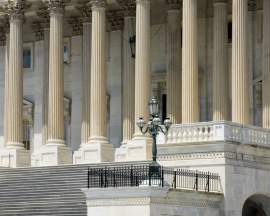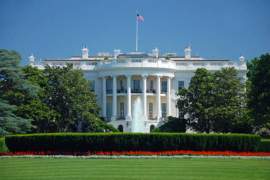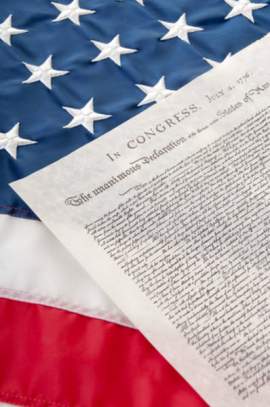
First Amendment

Popular In Constitution
Purpose Of Lifetime Appointment And Pros And Cons Enumerated Powers Bicameral Legislature Background Article 3 Of The Constitution We The People 1st Amendment Who Wrote The Constitution Judicial Review Equal Protection Clause 5th Amendment 10th Amendment Three Fifths Compromise
The First Amendment of the United States Constitution is contained in the Bill of Rights. The First Amendment has proven to be one of the most fundamental and important in respects to the rights attributed to the populace of the United States. Originally, the First Amendment was implemented and applied solely to Congress. However, by the beginning of the twentieth century, it was upheld that the First Amendment is to apply to all forms of government, including state and local levels. The Supreme Court decided that the Fourteenth Amendment Due Process Clause would apply to the 1st Amendment, and thus rendering such a decision.
As stated in the United States Constitution, "Congress shall make no law respecting an establishment of religion, or prohibiting the free exercise thereof; or abridging the freedom of speech, of of the press; or the right of the people peaceably to assemble and to petition the Government for a redress of grievances." Though a relatively short and concise assertion, the text provides for quite an encompassing set of rights that protect the citizens of the United States, and some of the most important and basic human rights. The First Amendment has many clauses that relate to each of the concepts that it sets out to protect. Religion is discussed in two clauses, one regarding the establishment of religion, and the other the free exercise of religion.
This proves to be one of the most important rights to secure by the Fathers of the Constitution, for so many people of European descent immigrated to the American Colonies to avoid religious persecution, and to find a safe haven to practice their religion of choice without any dire consequences. The First Amendment prohibits the government to establish a formal or national religion for the nation. It also addresses that there will be no preference of any particular religion, including the practice of no religion, or non religion.
The 1st Amendment guarantees the people of the United States the free exercise of religion, without interference from governmental factions. This right would also extend to any organization or individual infringing on such right, and would be deemed as unconstitutional.
One of the most commonly referred to clauses under the 1st Amendment is the freedom of speech. This clause has proven to be of great importance, particularly in the twentieth century and continues on with such regard in our lifetime. Under the text of the First Amendment, many issues are addressed regarding Freedom of Speech, and restrictions to exist in which such a practice may prove to be harmful to the general population or public. An example is the concept of sedition, and how this conduct can lead to insurrection against the government.
Other concepts also addressed include commercial speech, political speech, obscenity, libel, slander, and symbolic speech, such as the desecration of the American Flag. Under the First Amendment, there have been important and key court cases that have established a form precedence in how to apply the Amendment to these kinds of circumstances. The Freedom of the press is also included, and subject to similar restrictions as the freedom of speech.
The rights to petition and assembly often seem to be overlooked, for freedom of religion and speech are most commonly associated with the 1st Amendment. The right to petition is important because it gives citizens the opportunity to address their government in issues that have relevance and importance to the commonwealth. The formulation of an assembly, under the First Amendment, can be interpreted as citizens gathering and unifying for the purpose of communicating views or opinions on national issues, and for the relaying of pertinent information. The right to assembly is often related to that of petition, in such a way where citizens may assemble in the process of petitioning the government.



















